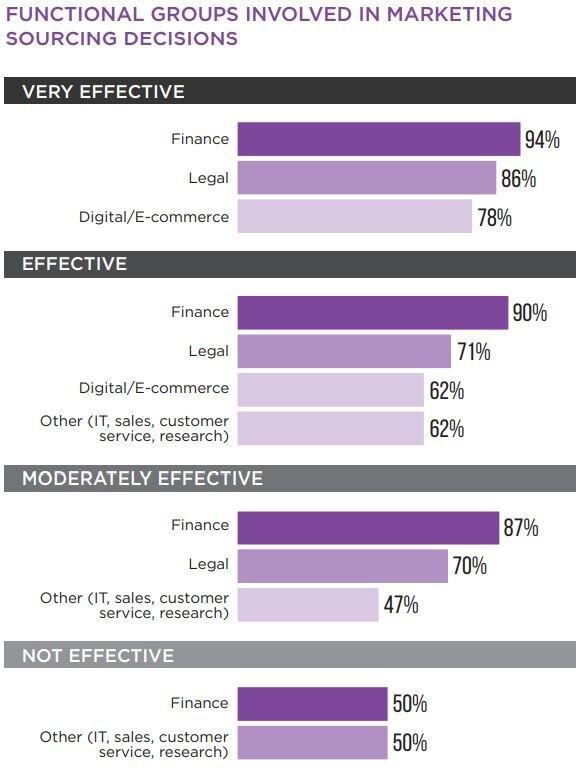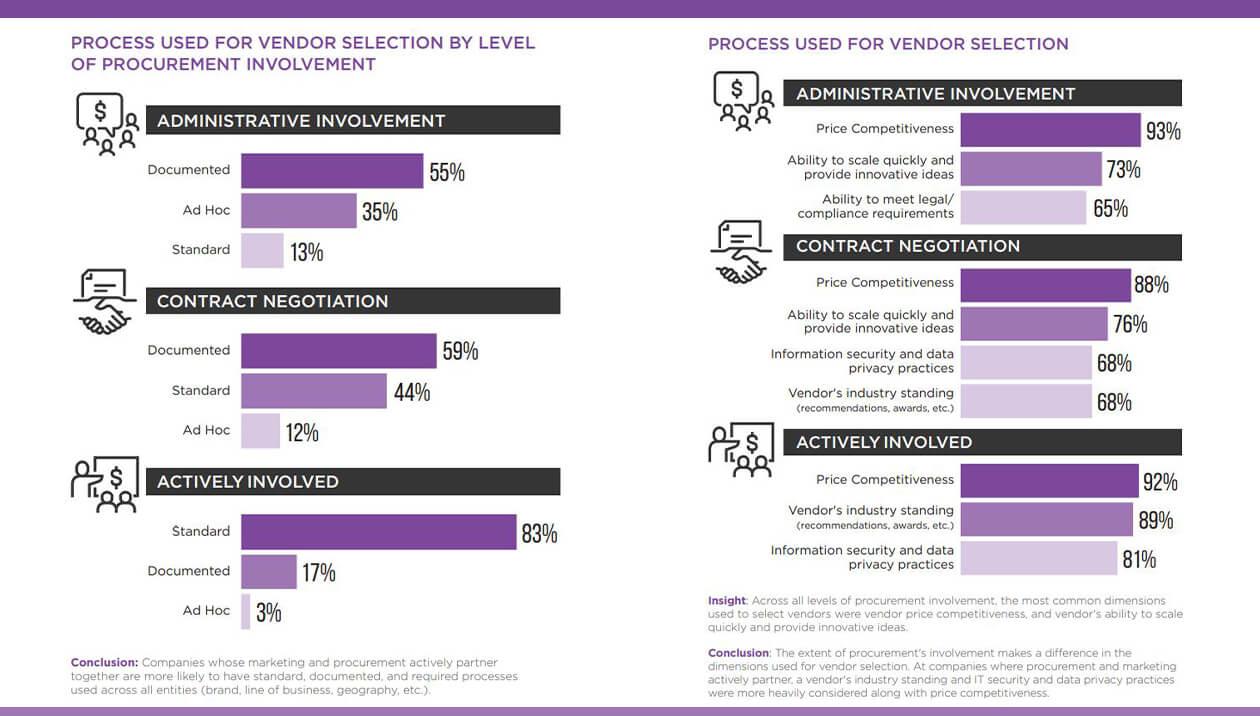
Study: 3 areas of marketing your procurement team should get involved in
share on
It is a known fact that marketing and procurement don't always see eye to eye when it comes to appointing agencies and vendors. In fact, procurement's role is often viewed as a cost-cutting one. A recent CMO Council report produced in partnership with KPMG found that 71% of marketers who limit or avoid procurement involvement say procurement doesn’t understand marketing, particularly with creative agencies and services. Also, only 26% of marketing leaders actively partner with procurement in the identification, selection and negotiation of marketing vendors. The report is based on a survey of over 200 marketing leaders across B2B and B2C industries.
While it might be true that the procurement teams can lack the relevant experience and knowledge about marketing, there are still advantages when having procurement in the picture.
The top three marketing sourcing areas that involve procurement are martech, marketing event services, and media agency selection.
More specifically, the report found that 78% of CMOs in "very effective" working relationships with procurement tend to involve other functional groups as well, most notably, digital and eCommerce. Procurement also participates in sourcing martech for digital CX and customer engagement. This not only points to greater digital maturity among CMOs but is helpful for the marketing team because procurement can provide a measure of confidence that martech purchasing decisions are made with due diligence, the report said.
This is especially crucial when there is a need for martech stacks to effectively integrate and support a company's overall digital transformation strategy and CMOs are mainly responsible for ensuring this happens.
At the same time, an effective marketing-procurement relationship can improve procurement cycle times, vendor price competitiveness, and vendor innovation capabilities.
According to CMO Council, CMOs who lead CX and digital transformation are more likely to play a larger role in the future of the company. At the same time, it was also found that 62% of business leaders consider the essential role of the CMO as a CX advocate and champion, followed by digital transformation.

On a related note, B2B marketers are often said to lag B2C marketers in delivering a seamless digital CX. As the B2B customer journey becomes increasingly autonomous and digitalised with online self-research and eCommerce, marketing becomes increasingly important at the top of the funnel.
If B2B marketers are looking to their B2C counterparts for best practices, the key to this would be making smarter marketing sourcing decisions, from martech to creative agencies, CMO Council said.
However, only 11% of B2B marketing leaders have procurement actively involved in marketing sourcing compared to 42% of B2C marketing leaders.
According to the report, having procurement actively involved in marketing sourcing can help aid with digital transformation. Another area that can potentially be influenced is innovation, which is another key focus for CMOs and a growth-hacking tool. Companies most actively involving procurement consider "vendor innovation" as a key area to work on, the report said. In fact, marketing is also better equipped to design innovation processes and deliver tangible benefits for the business by leveraging the expertise of procurement and IT.
When does procurement show its most value?
The more procurement is actively involved in the selection process, the more mature the selection capabilities. The report said that there is more likely to be standard, documented and required selection processes across all brands, lines of business and geographies. Dimensions for vendor selection, such as a vendor's industry standing, price competitiveness, and secondary features, for example IT security and data privacy practices for martech, are more heavily considered.
More than just a cost-cutting centre, procurement is also crucial in the creation of a standardised framework, including templates, scorecards and language, for side-by-side vendor comparisons. Without a common language, the report said comparisons would be difficult.

"Think of procurement as a strategic partnership that spans planning, vendor analysis, selection and management, rather than a box marketers need to check in contract negotiations. A rudimentary level of involvement will likely not generate any significant value for marketing," said Donovan Neale-May, executive director of the CMO Council.
Meanwhile, KPMG's customer advisory leader and marketing consulting practice lead, Jason galloway, said considering the uncertainties in the current socioeconomic environment, marketers are facing increased pressures to elevate performance and meet short- and long-term goals while facing added pressure on budgets and spending.
"Marketers can generate more value through a closer, more strategic partnership with procurement, leading to more robust marketing sourcing, management capabilities, and measures to assess performance. In fact, the new CMO Council report shows that the majority of marketers that have an effective working relationship with procurement have greater maturity in digital and could potentially unlock revenue growth through martech," he added.
Photo courtesy: 123RF
Related articles:
Procurement can be a marketer's most valued in-house resource
Analysis: Procurement's growing role in marketing pitches in times of budget crunch
Media and marketing leads view media function more negatively, but procurement improves
Procurement's involvement in media pitches: What is it costing agencies?
share on
Free newsletter
Get the daily lowdown on Asia's top marketing stories.
We break down the big and messy topics of the day so you're updated on the most important developments in Asia's marketing development – for free.
subscribe now open in new window
